
Book a Consultation
Thank you!
Your form has been sent successfully.

The lymphatic system is a set of tissues and organs that produce, store, and circulate white blood cells. It forms a part of the body’s immune system. The lymphatic system is where Hodgkin's lymphoma, also known as Hodgkin's disease, originates. Hodgkin’s lymphoma is a cancer of the lymphatic system caused by abnormal growth of B-lymphocytes (a type of lymphocyte). The affected lymphocytes lose their ability to fight infections, making the individual more susceptible to all sorts of infections.
Hodgkin’s lymphoma is characterized by very large, irregular cells called Reed-Sternberg (RS) cells, although other types of abnormal cells may also be present in the lymphatic system. The following are the four main types of Hodgkin’s lymphoma.
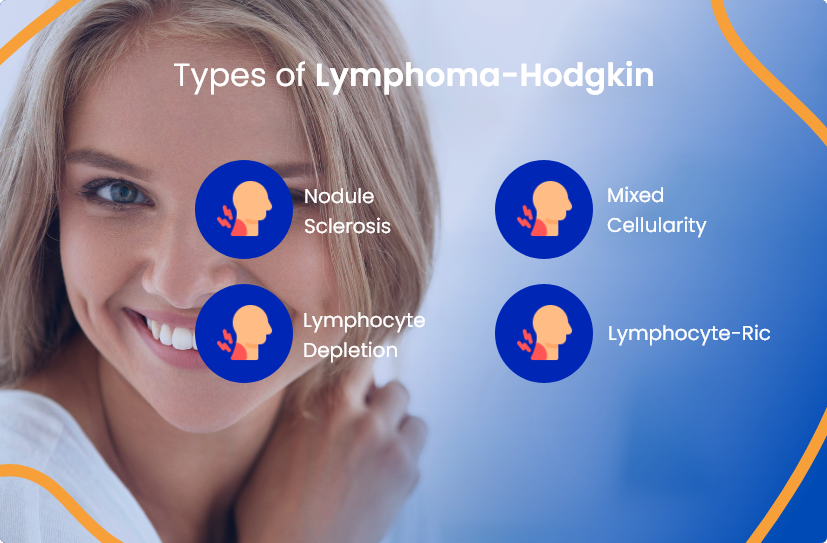
The most prevalent subtype of Hodgkin’s Lymphoma, known as nodular sclerosis, is characterized by the coexistence of normal white blood cells and Reed-Sternberg cells in the lymph nodes.
Reed-Sternberg lymph nodes are commonly present in men, along with several other types of cells.
This aggressive form of Hodgkin’s Lymphoma is characterized by a deficiency of normal lymphocytes and an excess of Reed-Sternberg cells.
There is a predominance of small lymphocytes mixed with Reed-Sternberg cells.
One or more enlarged (swollen) lymph nodes are the most common sign of Hodgkin’s Lymphoma. It's possible for the swollen lymph node to be in the abdomen, chest, armpit, or neck. The enlarged lymph node rarely hurts. There may also be additional indications of Hodgkin’s Lymphoma, such as.
 Night sweats
Night sweats
 Unexplained weight loss
Unexplained weight loss
 Fever
Fever
 Persistent tiredness
Persistent tiredness
 Shortness of breath
Shortness of breath
 Persistent cough
Persistent cough
 Loss of appetite
Loss of appetite
 Having an uncomfortable or swollen abdomen
Having an uncomfortable or swollen abdomen
 Feeling full after small meals
Feeling full after small meals
The two main therapies for Hodgkin’s Lymphoma are chemotherapy and radiation therapy. One or both of these therapies may be used, depending on the patient’s health status. Immunotherapy may be used to treat some patients, especially if earlier treatments have been ineffective.
The treatment plan will also depend on various factors like the staging of the tumor, a person’s age, general health, and the type of Lymphoma-Hodgkin.
The following are different treatment options that may be considered for the treatment of Lymphoma-Hodgkin.
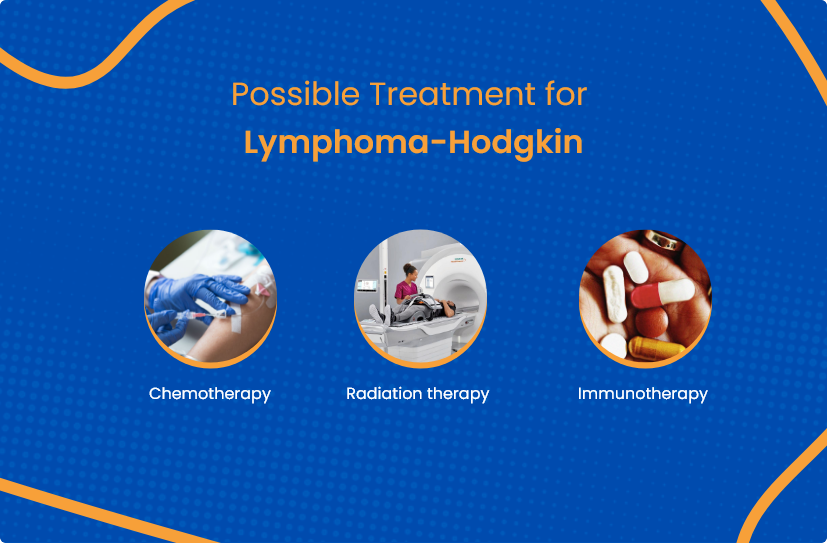
Chemotherapy is the most common form of treatment for Hodgkin’s Lymphoma. It comprises different medications since they each affect cancer cells differently. Chemotherapy-based treatment is administered in cycles, each of which consists of a treatment phase and a recovery phase. Each cycle normally lasts a few weeks.
When Hodgkin’s Lymphoma is in its earliest stage and has not spread to the other parts of the body, radiotherapy is usually the best treatment option. It eliminates cancer cells by using high-energy beams that resemble x-rays. Radiation treatment is often administered after a round of chemotherapy.
For lymphoma, there are now a number of FDA-approved immunotherapy treatments that use the patient's own immune system to fight cancer cells. Clinical trials for new types of immunotherapy are now being conducted for lymphoma, several of which have produced encouraging outcomes for both children and adults.
In most cases, a biopsy is required for diagnosis. During a biopsy, the doctor removes a sample of tissue to be examined in a lab. When a biopsy is not possible, the doctor may suggest other tests that can assist in making a diagnosis, such as:

1. Lumbar puncture
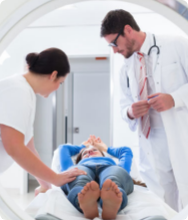
2. MRI
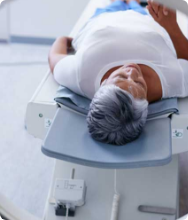
3. CT Scan
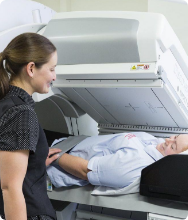
4. Bone Scan
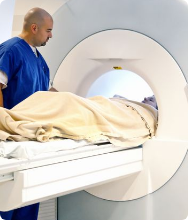
5. PET Scan
The prostate cancer specialists at ACTC in Florida are committed to offering exceptional patient care by prescribing efficient, personalized treatment strategies that are supported by evidence-based research. During a patient’s cancer journey, we focus both on physical and mental health, while cultivating a positive environment for patients and their families.
The following are our providers who you can consult at ACTC:

MD, Hematology & Oncology

MD, Ph.D., Hematology/ Medical Oncology

MD, Radiation Oncologist

ACTC is aware that no two cancers and no two cancer patients are the same. Every patient's care plan is created to match his or her needs and treatment objectives, from managing the condition to managing related side effects. Every step of the way, patients and their caregivers are included and enabled to make informed decisions about their treatment. Our staff will ensure that the treatment plan created for you is evidence-based, individualized, and delivered to meet your specific needs.
Schedule a consultation by calling
 352-345-4565
352-345-4565
Treatment for Hodgkin’s Lymphoma is highly effective and most people with the condition are eventually cured.
Hodgkin’s lymphoma can start almost anywhere, but it often starts in the lymph nodes in the upper part of the body.
Although some people may experience pain from an enlarged lymph gland, the tumors growing in it progress slowly - so that patients can be largely symptom-free for many years. Low-grade disorders start to rapidly progress after five to ten years, at which point they turn aggressive or high-grade and can manifest more severe symptoms.
Schedule a consultation by calling
 352-345-4565
352-345-4565